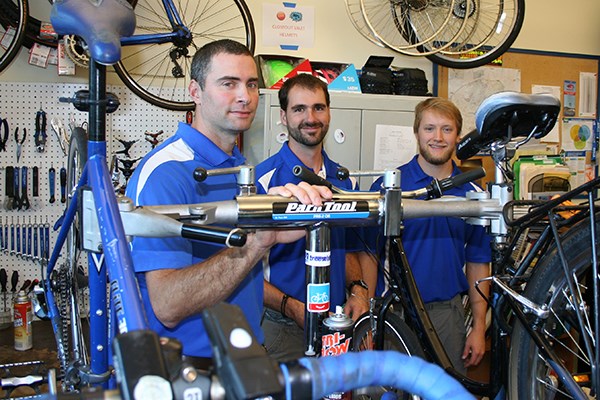UMass Lowell Joins Harvard, MIT as State’s Only Honorees

11/06/2015
By Ed Brennen
The university’s commitment to sustainable transportation — and a healthier lifestyle for students, faculty and staff — is being recognized in a big way.
UMass Lowell has been named a “Bicycle Friendly University” by the League of American Bicyclists (LAB), joining Harvard University and the Massachusetts Institute of Technology as the only schools in the state to earn the distinction.
After receiving an honorable mention last year in its first-ever application, the university elevated to bronze status in 2015, becoming one of only 127 Bicycle Friendly Universities in 42 states across the country.
“Receiving bronze is a significant achievement,” says Director of Campus Recreation Peter Murray, who oversees the university’s Bike Shop and Bike-Share programs. “It’s a big step forward for us.”
Murray says the recognition is a direct result of a collaborative approach taken by campus and city leaders to encourage bicycle use. Based on recommendations from the LAB following last year’s submission, the university created a Bicycle Advocacy Committee, bringing together members of the UMass Lowell Police Department, the Office of Sustainability, UCAPS, the Lowell Bicycle Coalition and others to work on solving the needs of bicycle riders and to plan future projects that will encourage even more people to ride to and from campus.
“We really took a partnership mentality,” says Murray, who adds that the committee’s work focuses on what the LAB calls “The Five E’s”: engineering (or infrastructure), education, encouragement, enforcement, and evaluation and planning.
Freewheelers surge
Another major factor in the university’s distinction was the continued growth of the Freewheelers bike-share program. What started in 2007 with five bicycles at the Campus Rec Center has grown to a fleet of 35 bicycles (30 for daily checkout, five for weekly loan) at five locations across campus: University Crossing, O’Leary and Lydon libraries, Riverview Suites and the Rec Center.
And those bicycles are being put to good use. From July to October this year there were 1,738 bicycle checkouts, a 16.6 percent increase from 2014. The number of unique participants, meanwhile, increased 15.2 percent, from 368 to 424.
“Students are interested in sustainable transportation, so having it be free at multiple checkout locations on campus has been a big thing,” says Murray, who is just as encouraged by the number of students who bring their own bicycles to campus.
“That’s where we’re seeing the most growth,” he says. “There’s probably twice as many bikes on campus now compared to five years ago. The bike racks are filled everywhere.”
Bike Shop’s hopping
More bicycles on campus has also led to a big bump in business at the university’s Bike Shop, located on the second floor of the Rec Center. According to Assistant Director of Outdoor & Bicycle Programs Kevin Soleil, who runs both the Freewheelers and Bike Shop operations, there were 185 shop transactions for fiscal year 2015, a whopping 230 percent increase from the year before.
“We have a lot of great momentum, and this designation is a good affirmation of the work we’ve put in so far,” says Soleil, an alum who graduated in 2005 with a degree in music performance and sound recording technology.
Soleil says the goal of the Bike Shop, which is celebrating the university’s bronze status by offering free 20-minute “ride prep” tune-ups from Nov. 6 through 13, is to do more than provide quality and affordable parts and repair services.
“We really want to encourage people to use this space and build a community through bicycles,” says Soleil, who joined the staff in July. “In the coming semesters we’re looking to provide learning opportunities for students and the university community. We want to offer open (bike) stand time and mechanic-assisted stand time so they can get their hands on their own bikes.”
Shifting gears
Looking down the road, Murray says the university would like to create a bicycle master plan that would foster further collaboration with the city. Lowell recently adopted a “Complete Streets Policy” that calls for future road projects to take into account cars, bicycles and pedestrians, a move that Murray says will only improve cycling in the city.
“If we can encourage students to use sustainable transportation, whether it’s biking or walking, we should be doing that,” Murray says. “And hopefully they’ll translate it to using those forms of transportation beyond college.”
Murray says the university will also soon launch a Freewheelers mobile app that will allow users to check on availability, and a new webpage (uml.edu/bike) is in the works for the spring. Additionally, his team is looking to start a discount bicycle purchase program for students, faculty and staff, similar to the university’s electric vehicle purchase program with the Nissan LEAF.
“We have a relationship with Fuji bicycles, so we could purchase them at wholesale cost and pass on the discount,” says Murray, who also hopes to see indoor bicycle parking added where possible on campus for increased security.
“Our goals are tied to the whole idea of transformational education,” he says. “This is something that could change people’s lives both from a health perspective, as well as helping the environment. We want to help students do that.”
